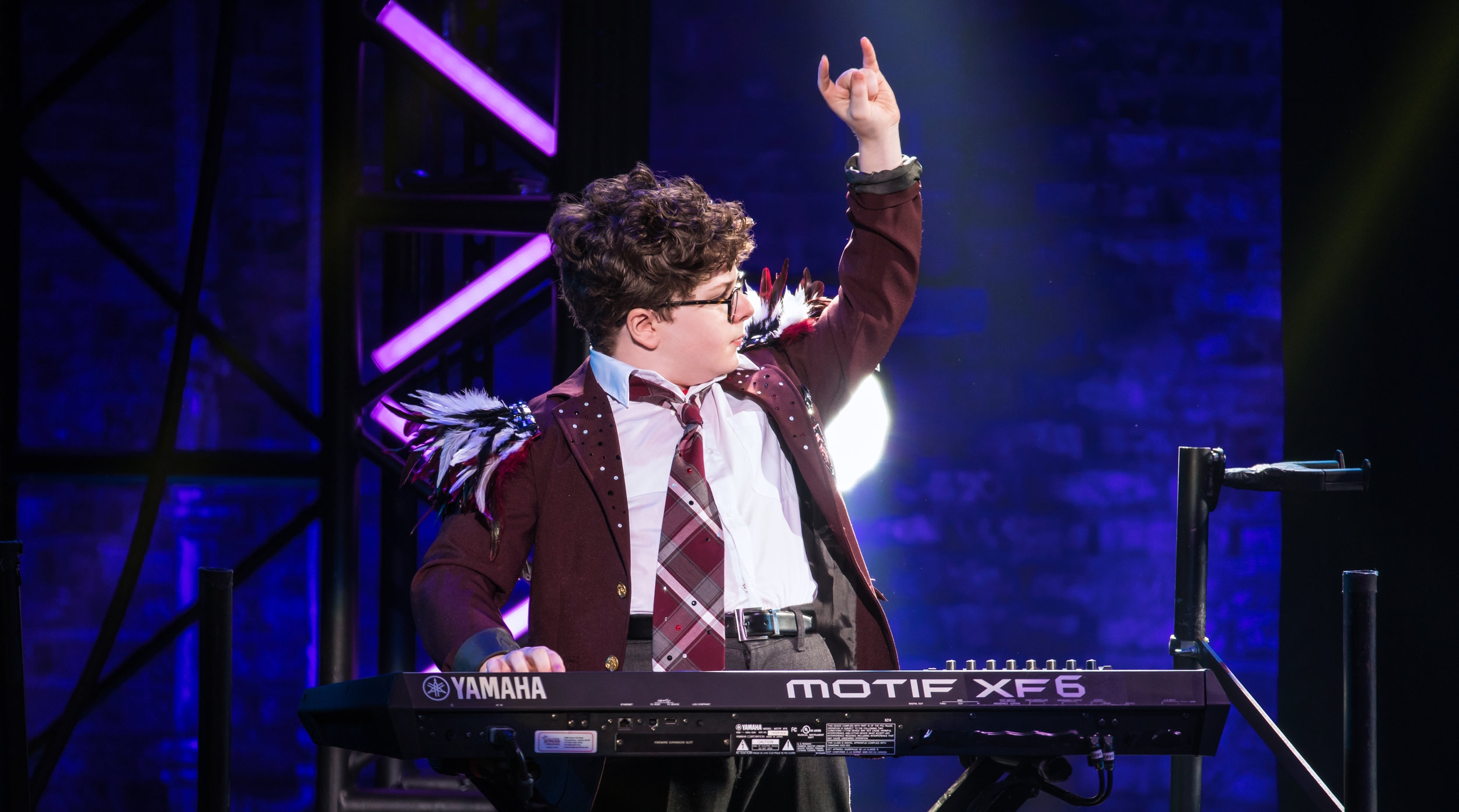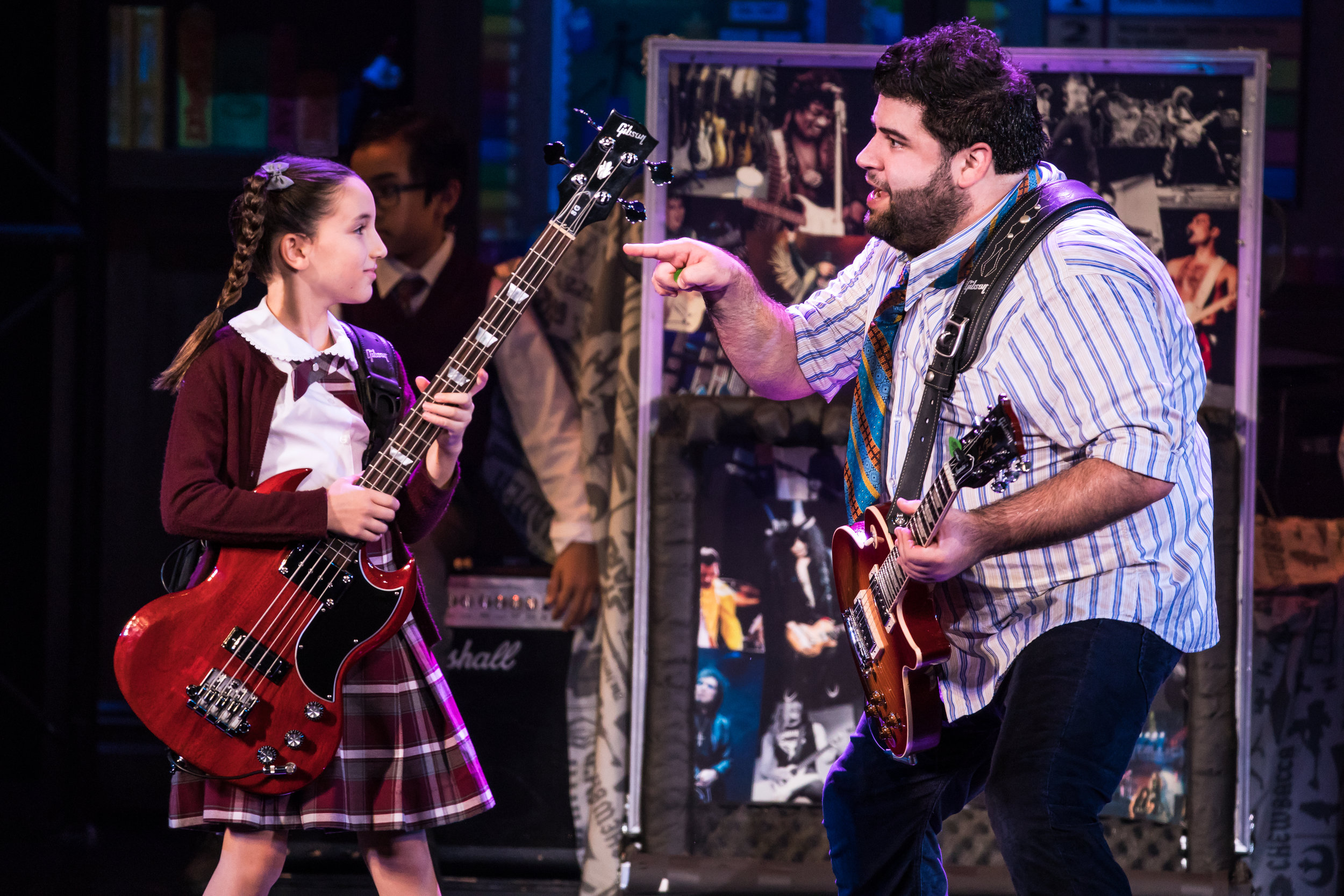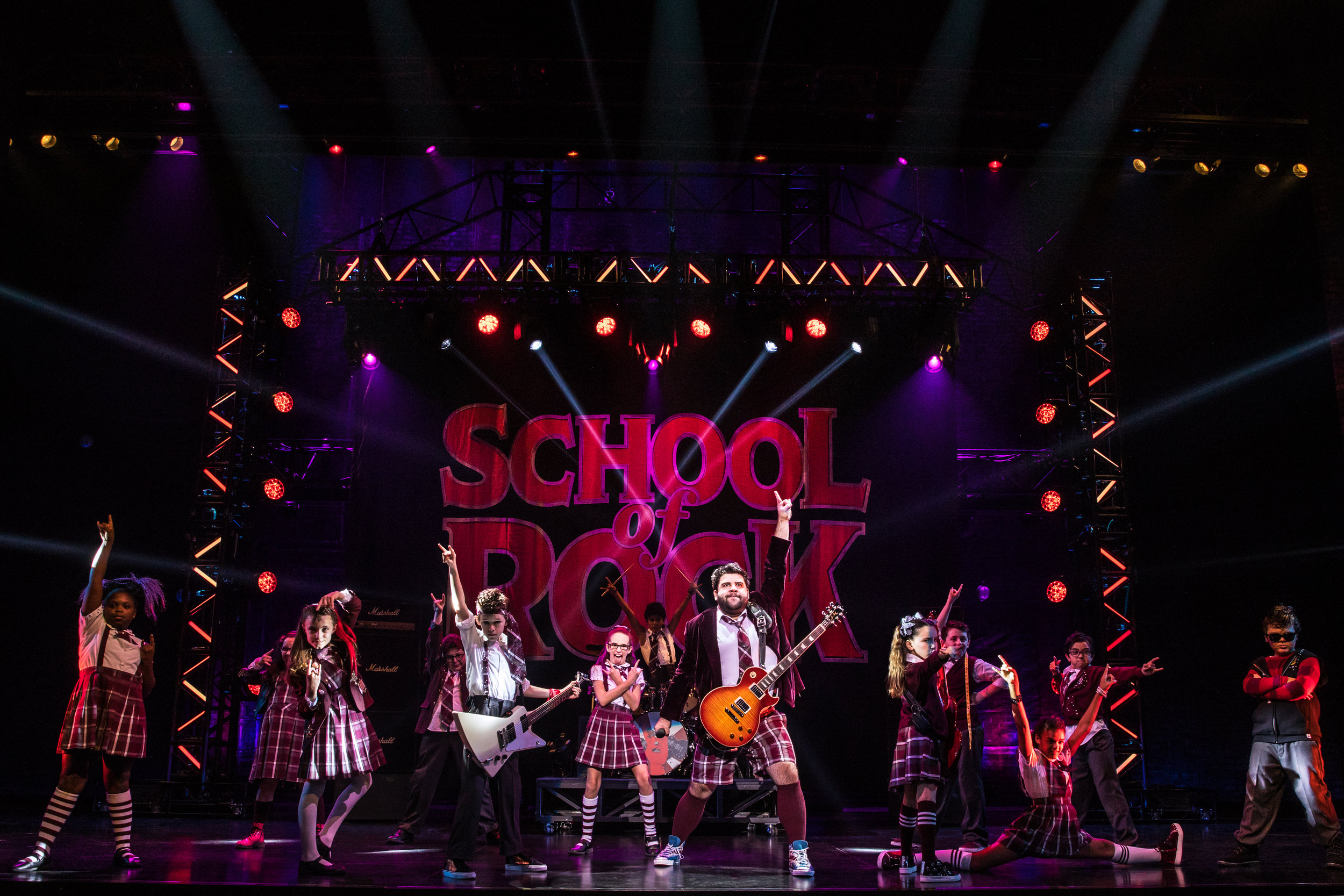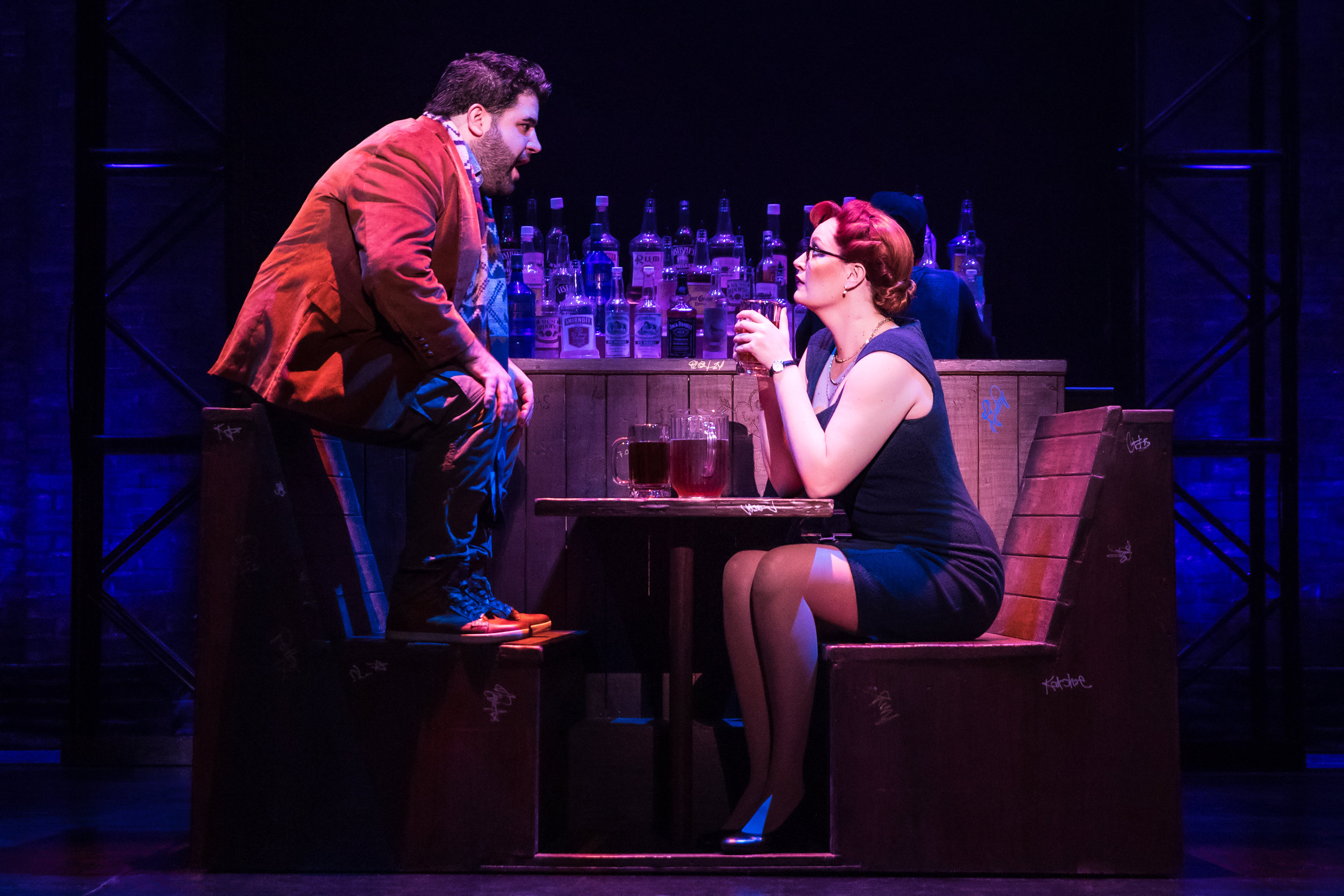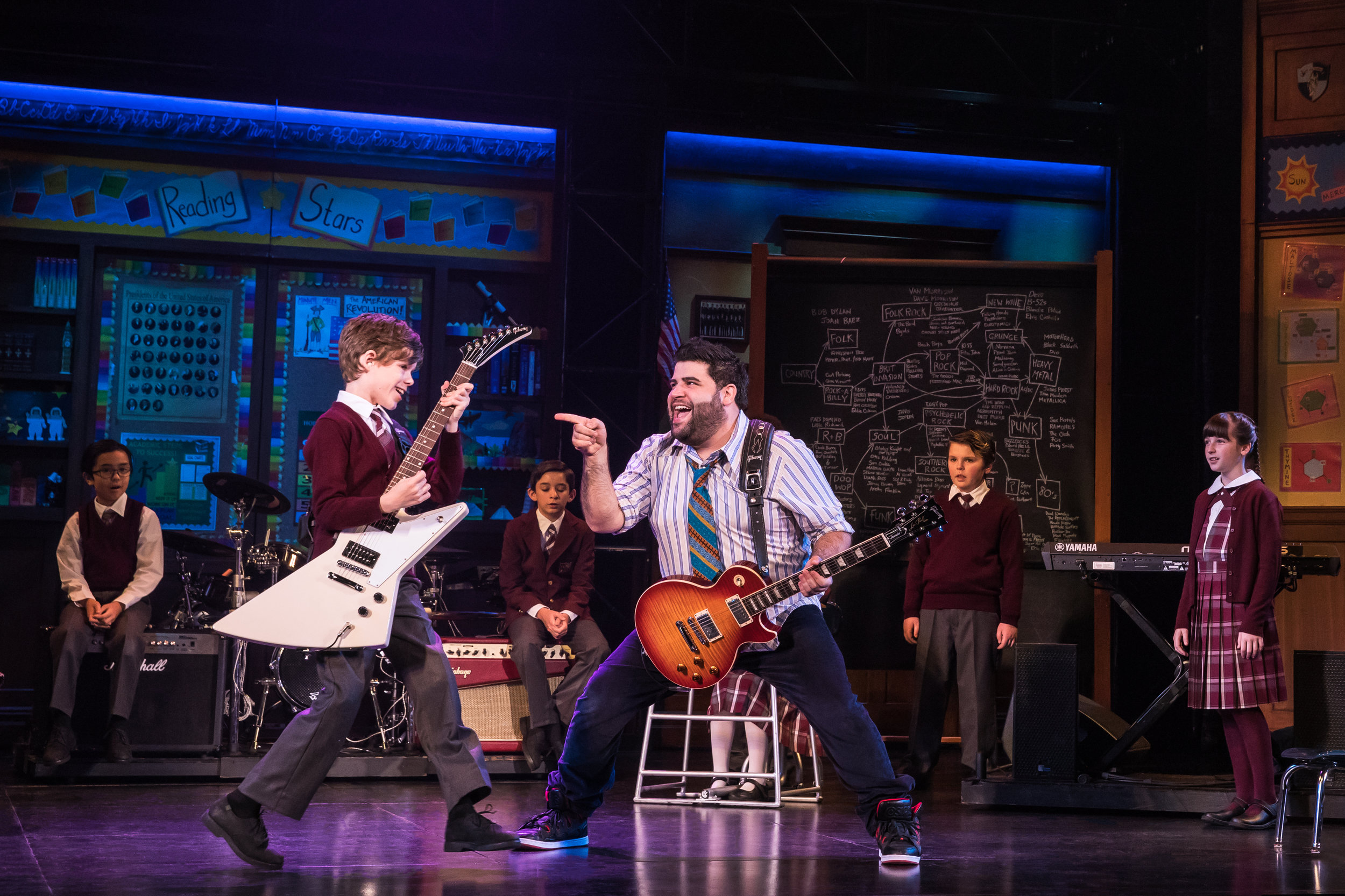Pairing old-school classics sung by some rockin’ kids proved to be the perfect ingredients for a hit movie.
The film, School of Rock, featured breakout star Jack Black as the good-intentioned, die-hard rock ‘n’ roller Dewey Finn. The film’s music included iconic rock songs from The Doors, The Clash and several other classic bands. Even Led Zeppelin, known for not distributing rights for their music, granted them permission to include “Immigrant Song” after the production team filmed Jack Black on set begging the band to use the song. The production team sent the video to the band, and the plan worked. The movie was released in 2003, opened at number one and was nominated and won several awards. Audiences and critics agreed that the show was a riot!
A decade later, in 2013, the legendary Andrew Lloyd Webber secured the stage rights to the show, and producers put plans into motion for a Broadway takeover. Casting directors held open auditions at the beginning of 2015 to find the most talented rock and roll kids in town. Laurence Connor would direct the show, with lyrics by Glenn Slater, a book by Julian Fellowes and new music by Andrew Lloyd Webber. Today the show has companies on Broadway and in the West End along with a North American National Tour.
School of Rock Q&A with the Creative Team
Orchestration, Music & Lyrics- Andrew Lloyd Webber
Book- Julian Fellowes
Director- Laurence Connor
I'd love to start with the inspiration of this project.
ANDREW LLOYD WEBBER I suppose the thing that I picked up on immediately was that it's about the incredible empowering force that music can be. And, therefore, it's really about how music changes the life of the kids in the show, and also changes the life of the leading man, because he finds himself, in a way, through the children and the music that they're making. So it's, in a way, a story about music. And that's what I think excited me.
Also, it's particularly exciting for me because I started with Joseph and the Amazing Technicolor Dreamcoat, which was a piece written for a school, performed first in a school. And it's taking me back to something that I really care very deeply about, which is the importance of music in schools and education. I'm very much involved in Britain, and I'm going to become a little bit more involved here [the US], with proving how important music is in education, which I do through my foundation in Britain. It really is something that empowers kids, in all areas of life. So, in a way, that's really why I was drawn to this story.
Look, School of Rock is fun. Hopefully, I've fleshed it out with a few catchy songs and kept the spirit of the original movie. Hopefully, it's something that you will go to in and say "I had a really good time." But, hopefully you will also take out of it the central message of the story – which is a very warm and very simple one – which is about the empowering force of music.
Originally, the idea was first mooted to me, by my wife Madeleine, who got the rights to the whole thing. I thought maybe it was something that we would flesh out with existing rock songs, because there were a few in the original movie. But when I got into it, they were only tiny little fragments and there was only really the song we all called "Teacher's Pet" and then "The Legend of the Rent." It was also in the movie, but there wasn't very much other than those two original songs. So, I thought that it really did need a score.
When I first looked at the story, the first thought I had was: “can I, in any way, bring anything to the table here?” And I saw a couple of moments in the movie where I thought I could. And so, my next port of call really was to talk to a major dramatist, because when you're dealing with something which is a very successful film like this, which has got a whole life of its own, I really wanted to talk to somebody who also has had a major career in film, television. And Julian Fellowes, who I know has also written for the theater, was a very obvious choice, at least to me, because he's a real craftsman.
Of course, Julian, you’re best known for creating “Downton Abbey,” which is pretty different from the world of “School of Rock.”
JULIAN FELLOWES I know. It’s not a very obvious transition, is it? But still, it was very flattering and, of course, it's always good to do something that's completely outside your kind of tame territory. And I don't think I could be much further from Downton Abbey than School of Rock. So, I was thrilled when Andrew asked me if I'd do it. Anyway, I love the film. I thought Jack Black was fantastic and I thought all of it; script, everything, was terrific. Sometimes you have to talk yourself into things, or at least research them, to see if you want to do it. But I knew I wanted to do it straight away.
I went to see the show and then I went back and looked at the movie again, just to get kind of A and B comparison. You gave the kids more of a back story.
JULIAN FELLOWES I think with the exception of Summer, who is a prominent character in the film and in the show. But I think we've defined the other children rather more than in the film and given them a situation and given them problems. We know, I think, slightly more clearly the effect that Dewey is having on them and having on their lives, which seemed right to sort of open it up a bit. So, it wasn't just the story of Dewey, although obviously Dewey is the temple of the whole thing. But nevertheless, we know a little bit more about Rosalie [the head mistress] and about the other teachers. And that's what we've done really. I think it makes the children's parts a little more interesting to play, apart from anything else; that they just they are all more defined as characters.
I think my job was to give a kind of emotional imperative, a kind of emotional path, for all the different characters, which is either suggested or pretty clearly delineated. And to add that to the central comedy of the situation. But I hope we've been very faithful to the film too. I want people who adored the film to have a really good evening in the theater. I don't want them to be disappointed. Actually it wasn't all that dissimilar from Mary Poppins. You had the strange thing of two parents; you had the books and the film. And so that was quite a juggling act, too. But that's what it is really; I think you're trying to be faithful to the people who loved the film, so they'll enjoy themselves in this, but also to give them a slightly different experience that is just slightly more emotional.
Laurence, how did the collaboration work, over the two-year process of writing and creating the show?
LAURENCE CONNOR We first all sat around a table; myself, Julian, Glenn [Slater, lyricist] and Andrew, and just talked about how we could actually make it into a show and what kind of things we wanted to bring to it. And we all had very different ideas, but it was interesting how we clicked into each other's way of thinking and how the collaboration of the building of the show was immediate.
I think "If Only You Would Listen" was one of the first song titles. I think we actually came up with that song title the first time we sat around the table, because we just knew that there was something in that. And the importance of that message and that what Dewey does for the children is that, even though he seemingly is disinterested in them at the beginning, by the end of it, he is the only one that they feel listen. And so that was that's how we knew what that world was going to be.
You know, the not-so-secret sauce of “School of Rock” is that the children in the cast can not only sing, act and dance, but the ones in the band play their instruments really well!
ANDREW LLOYD WEBBER You know, they really can play. It's extraordinary for their age, just how great they are and how together they play. I mean, you would you close your eyes and you say “Oh gosh, this is a band that's played together for three or four years.” You wouldn't really think that it’s 10 and 11 year olds! The togetherness of them is actually the thing that is almost more extraordinary, because you knew that you could get lots of kids who can do individual solos or whatever, but actually play together as a rock rhythm section? That is something.
JULIAN FELLOWES I mean they are absolutely extraordinary. And they can all act. And there is something very moving about that. I mean you are sort of half moved to tears simply by the fact that they're playing this music.
Were you a little nervous that you were creating a show that depends so much on children?
ANDREW LLOYD WEBBER The answer is yes. And we saw 22,000 children. I hasten to say I personally didn't see 22,000 children, but the [casting] people did and we got it down to 100.
LAURENCE CONNOR We did a huge open audition here at the Winter Garden and we watched some incredible kids playing instruments, like really amazing. But what we didn't know was whether they would be cohesive as a band. So, in the end, we brought about 24 children into a room, and we set up some amps and plugged in some guitars and set up a drum kit and they just played. And the first band we put together just rocked! And it was emotional. I mean, I think we all had little tears in our eyes. I think it really goes down as my favorite audition of all time.
One of the highlights of the show is “You’re in the Band,” where we first get to hear the kids play together. I wonder if you could just talk a little bit about how you crafted that moment.
ANDREW LLOYD WEBBER It's a bit of a gift really, because it's Dewey putting together the band, so we start with him showing the kids famous rock phrases; we do "Smoke on the Water," we do "Satisfaction" and then the boy who plays classical music comes in with a bit of the Moonlight Sonata on the organ and then the drummer does the drum.
And then, bit by bit, he's pieced together the band. And it's one of those musical theater moments; when they finally come together, it's almost like when Eliza in My Fair Lady speaks "proper." You suddenly say, "oh my god they actually can do it!" It's one of the moments I find great in the show. It still gives me – and I've seen it quite a few times – a bit of a buzz.
When I spoke to people about “School of Rock,” some said “Andrew Lloyd Webber and Julian Fellowes are doing this?” And I said, “don't forget, Andrew Lloyd Webber wrote “Jesus Christ Superstar,” which was one of the first rock musicals.
ANDREW LLOYD WEBBER At the time I was writing Jesus Christ Superstar, all the kind of bands who Dewey, in the movie, loved were all working and coming up to their peak. When we recorded Superstar, Led Zeppelin were in the studio next door making an album. And so, at that time, we kind of crossed over. They were a bit older than me, but I did at least get to say hello to them in the corridor, as it were. And, I mean, the Stones recorded in the studio we were in! Also, in those days, when we were doing Superstar, kind of anything went. I mean, the Stones had the Bach Choir on one of their songs; "You Can't Always Get What You Want." Deep Purple were playing around with the idea of an orchestra. So, when I was doing Superstar, it was all natural for me to absorb, because I was I was a child of that time, you know? The lead singer of Deep Purple was our Jesus on the original Jesus Christ Superstar album. So, coming back to doing this wasn't a huge leap for me.

